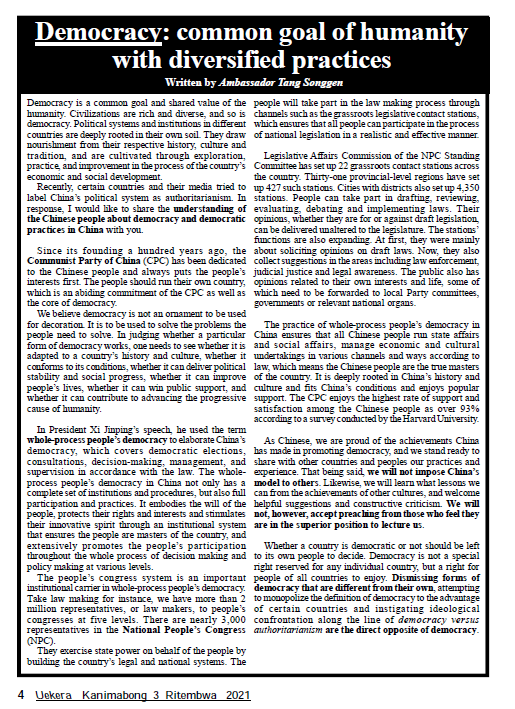Democracy: Common Goal of Humanity with Diversified Practices
On 3rd December, Ambassador Tang Songgen published an article entitled "Democracy: common goal of humanity with diversified practices" on Kiribati newspapers Uekera and Newstar. The full text of the article is as follow:
Democracy: Common Goal of Humanity with Diversified Practices
Tang Songgen
Democracy is a common goal and shared value of the humanity. Civilizations are rich and diverse, and so is democracy. Political systems and institutions in different countries are deeply rooted in their own soil. They draw nourishment from their respective history, culture and tradition, and are cultivated through exploration, practice, and improvement in the process of the country’s economic and social development.
Recently, certain countries and their media tried to label China’s political system as authoritarianism. In response, I would like to share the understanding of the Chinese people about democracy and democratic practices in China with you.
Since its founding a hundred years ago, the Communist Party of China (CPC) has been dedicated to the Chinese people and always puts the people’s interests first. The people should run their own country, which is an abiding commitment of the CPC as well as the core of democracy.
We believe democracy is not an ornament to be used for decoration. It is to be used to solve the problems the people need to solve. In judging whether a particular form of democracy works, one needs to see whether it is adapted to a country’s history and culture, whether it conforms to its conditions, whether it can deliver political stability and social progress, whether it can improve people’s lives, whether it can win public support, and whether it can contribute to advancing the progressive cause of humanity.
In President Xi Jinping’s speech, he used the term whole-process people’s democracy to elaborate China’s democracy, which covers democratic elections, consultations, decision-making, management, and supervision in accordance with the law. The whole-process people's democracy in China not only has a complete set of institutions and procedures, but also full participation and practices. It embodies the will of the people, protects their rights and interests and stimulates their innovative spirit through an institutional system that ensures the people are masters of the country, and extensively promotes the people’s participation throughout the whole process of decision making and policy making at various levels.
The people’s congress system is an important institutional carrier in whole-process people’s democracy. Take law making for instance, we have more than 2 million representatives, or law makers, to people’s congresses at five levels. There are nearly 3,000 representatives in the National People’s Congress (NPC). They exercise state power on behalf of the people by building the country’s legal and national systems. The people will take part in the law making process through channels such as the grassroots legislative contact stations, which ensures that all people can participate in the process of national legislation in a realistic and effective manner.
Legislative Affairs Commission of the NPC Standing Committee has set up 22 grassroots contact stations across the country. Thirty-one provincial-level regions have set up 427 such stations. Cities with districts also set up 4,350 stations. People can take part in drafting, reviewing, evaluating, debating and implementing laws. Their opinions, whether they are for or against draft legislation, can be delivered unaltered to the legislature. The stations’ functions are also expanding. At first, they were mainly about soliciting opinions on draft laws. Now, they also collect suggestions in the areas including law enforcement, judicial justice and legal awareness. The public also has opinions related to their own interests and life, some of which need to be forwarded to local Party committees, governments or relevant national organs.
The practice of whole-process people’s democracy in China ensures that all Chinese people run state affairs and social affairs, manage economic and cultural undertakings in various channels and ways according to law, which means the Chinese people are the true masters of the country. It is deeply rooted in China’s history and culture and fits China’s conditions and enjoys popular support. The CPC enjoys the highest rate of support and satisfaction among the Chinese people as over 93% according to a survey conducted by the Harvard University.
As Chinese, we are proud of the achievements China has made in promoting democracy, and we stand ready to share with other countries and peoples our practices and experience. That being said, we will not impose China’s model to others. Likewise, we will learn what lessons we can from the achievements of other cultures, and welcome helpful suggestions and constructive criticism. We will not, however, accept preaching from those who feel they are in the superior position to lecture us.
Whether a country is democratic or not should be left to its own people to decide. Democracy is not a special right reserved for any individual country, but a right for people of all countries to enjoy. Dismissing forms of democracy that are different from their own, attempting to monopolize the definition of democracy to the advantage of certain countries and instigating ideological confrontation along the line of democracy versus authoritarianism are the direct opposite of democracy.


Source: Embassy of The People's Republic of China in the Republic of Kiribati
Photos
Related Stories
Copyright © 2021 People's Daily Online. All Rights Reserved.










